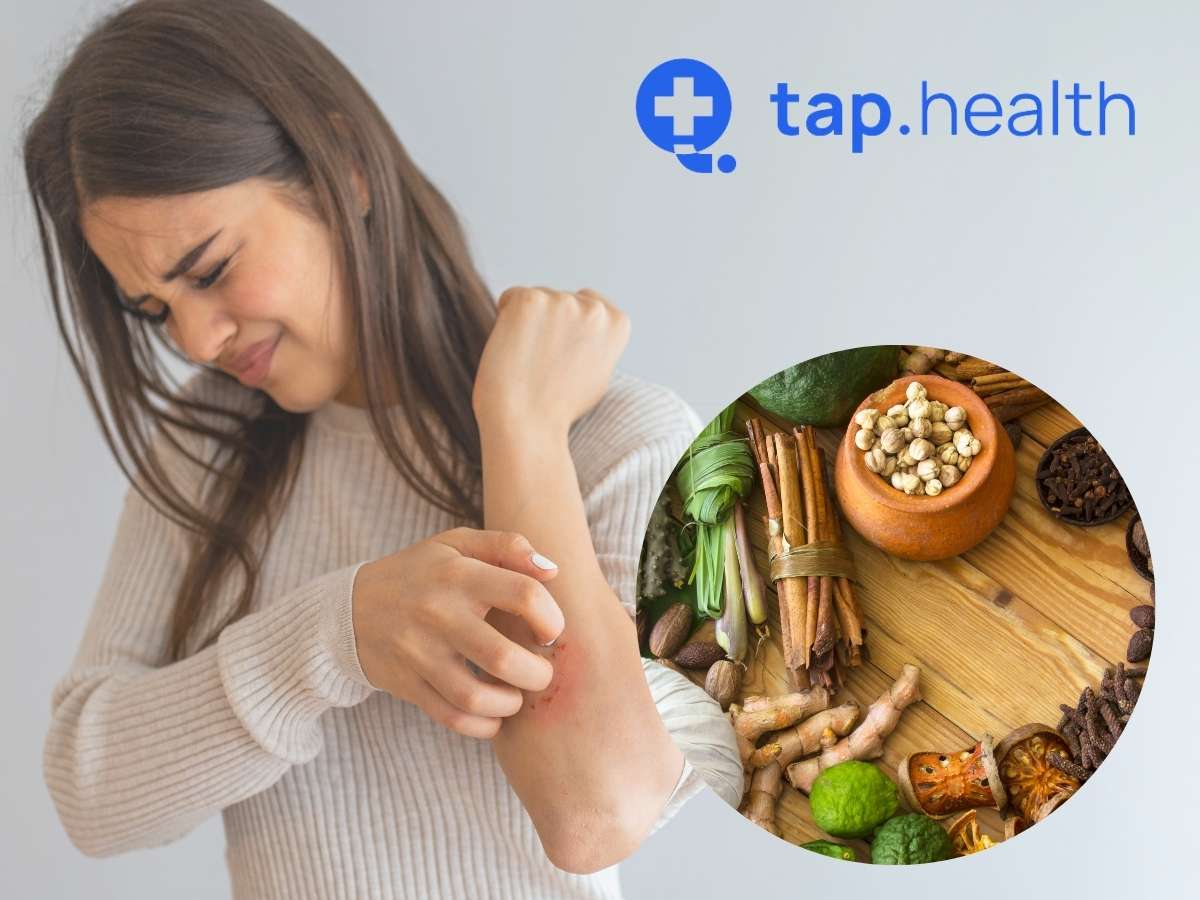Eczema, also known as atopic dermatitis, is a chronic inflammatory skin condition characterized by itchy, red, and dry patches on the skin. It can affect people of all ages, but it is particularly common in children. The exact cause of eczema is not well understood but is believed to result from a combination of genetic and environmental factors. Common triggers include allergens, irritants, stress, and climate changes. This article explores the benefits of Ayurvedic treatment for eczema compared to conventional treatments and delves into various Ayurvedic remedies and practices.
What is Eczema And What are its Causes?
Eczema is a multifactorial condition, meaning that several factors contribute to its development. Understanding these factors can help manage and prevent flare-ups.
1. Genetic Factors
Genetics plays a significant role in the development of eczema. If one or both parents have eczema or other atopic conditions such as asthma or hay fever, their children are more likely to develop eczema. Mutations in the filaggrin gene, which is responsible for maintaining the skin’s barrier function, can weaken the skin’s protective layer, making it more susceptible to irritants and allergens.
2. Environmental Triggers
Environmental factors can exacerbate eczema symptoms. Common triggers include:
- Allergens: Pollen, pet dander, dust mites, and mold can trigger eczema flare-ups.
- Irritants: Soaps, detergents, shampoos, and cleaning products can irritate the skin.
- Climate: Cold, dry weather can cause the skin to become dry and itchy, while hot, humid weather can lead to sweating and irritation.
- Pollutants: Air pollution and exposure to chemicals can aggravate eczema.
3. Immune System Dysfunction
In individuals with eczema, the immune system overreacts to external stimuli, leading to inflammation and itching. This overactive immune response can cause the skin to become red, swollen, and itchy.
4. Skin Barrier Deficiencies
The skin’s barrier function is compromised in individuals with eczema. A healthy skin barrier keeps moisture in and prevents irritants and allergens from entering. When this barrier is weakened, the skin becomes dry and more susceptible to infections and irritants.
What are the Symptoms of Eczema?
Understanding the symptoms of eczema is crucial for proper diagnosis and management. The following are common symptoms of eczema:
1. Itching
Itching is often the most prominent symptom of eczema. It can be severe, especially at night, and can lead to scratching that worsens the condition. Persistent scratching can cause the skin to become thickened and leathery.
2. Reddened, Inflamed Skin
Eczema causes patches of skin to become red or brownish-gray. These inflamed areas can be particularly uncomfortable and may spread if not managed properly.
3. Dryness
The affected areas of the skin are usually dry and may crack or peel. This dryness can lead to further irritation and discomfort.
4. Blisters and Oozing
In some cases, blisters may form and ooze fluid. This can be particularly distressing and increase the risk of infection if the skin is broken.
5. Thickened, Leathery Skin
Chronic scratching and inflammation can cause the skin to become thickened and scaly. This condition, known as lichenification, can be challenging to treat and may require specialized care.
Also Read: 15 Homeopathic Remedies for Eczema
8 Ayurvedic Treatments For Eczema
Ayurveda, the traditional system of medicine from India, offers a holistic approach to treating eczema by addressing the root causes rather than just the symptoms. Unlike conventional treatments that often rely on topical steroids and antihistamines, Ayurvedic remedies aim to balance the body’s internal environment through natural methods. Here are ten Ayurvedic treatments for eczema:
1. Herbs
Ayurvedic herbs play a vital role in managing eczema. They offer natural anti-inflammatory, antibacterial, and soothing properties that help alleviate symptoms.
Neem (Azadirachta indica)
Neem is renowned for its anti-inflammatory and antibacterial properties. It helps soothe the skin and reduce itching. Neem oil can be applied topically, and neem leaf extracts can be taken internally for detoxification. Regular use of neem can help maintain healthy skin and prevent flare-ups.
Turmeric (Curcuma longa)
Turmeric’s anti-inflammatory and antioxidant properties make it effective in reducing inflammation and promoting healing. A paste made from turmeric powder and water can be applied to the affected areas. Consuming turmeric with warm milk or honey can also provide internal benefits.
Aloe Vera (Aloe barbadensis miller)
Aloe vera gel has cooling and moisturizing effects, which help alleviate dryness and itching. Applying fresh aloe vera gel directly to the skin provides instant relief and promotes healing. Aloe vera can also be consumed in juice form for additional benefits.
2. Diet Changes
Ayurveda emphasizes the importance of diet in managing eczema. Certain foods can either aggravate or alleviate eczema symptoms.
Avoid
- Spicy Foods: Spicy foods can increase inflammation and exacerbate eczema symptoms.
- Oily Foods: Oily and greasy foods can lead to skin breakouts and worsen eczema.
- Processed Foods: Processed and junk foods contain additives and preservatives that can trigger flare-ups.
Include
- Fresh Fruits and Vegetables: Incorporating fresh fruits and vegetables into your diet provides essential vitamins and minerals that promote skin health.
- Whole Grains: Whole grains like brown rice, quinoa, and oats provide fiber and nutrients that support overall well-being.
- Cooling Foods: Foods like cucumber, leafy greens, and melons have cooling properties that help reduce inflammation.
Hydration
Staying hydrated is crucial for maintaining skin moisture. Drinking plenty of water and consuming hydrating foods like watermelon and coconut water can help keep the skin supple and prevent dryness.
3. Meditation
Stress is a significant trigger for eczema flare-ups. Incorporating meditation into your routine can help manage stress levels and promote overall well-being.
Mindfulness Meditation
Regular practice of mindfulness meditation can reduce stress and improve emotional health. Meditation helps calm the mind and body, reducing the likelihood of eczema exacerbations. Simple techniques like deep breathing and focusing on the present moment can be highly effective.
4. Yoga
Yoga combines physical postures, breathing exercises, and meditation to promote physical and mental harmony. Specific yoga poses can improve circulation and reduce tension, benefiting those with eczema.
Specific Poses
- Child’s Pose (Balasana): This pose helps relax the body and mind, reducing stress and tension.
- Cobra Pose (Bhujangasana): Cobra pose improves circulation, stimulates the immune system, and promotes overall well-being.
- Cat-Cow Pose (Marjaryasana-Bitilasana): This gentle flow between cat and cow poses stretches and strengthens the spine, reducing tension.
5. Panchakarma
Panchakarma is a detoxification process in Ayurveda that involves therapeutic vomiting, purging, enemas, and other cleansing techniques. It aims to remove toxins from the body and restore dosha balance.
Vamana (Therapeutic Vomiting)
Vamana is a procedure that induces vomiting to cleanse the digestive system and remove toxins. It is used to treat conditions caused by excess Kapha dosha, including eczema.
Virechana (Purgation Therapy)
Virechana involves the administration of purgative substances to cleanse the intestines and liver. It helps eliminate toxins and balance the Pitta dosha.
Basti (Enema Therapy)
Basti therapy involves the introduction of medicinal oils and decoctions into the rectum. It helps cleanse the colon and balance the Vata dosha, promoting overall health.
6. Abhyanga (Oil Massage)
Daily self-massage with medicated oils can nourish and moisturize the skin, reducing dryness and inflammation. Abhyanga helps improve circulation, relaxes the muscles, and calms the mind.
Sesame Oil
Sesame oil is commonly used in Abhyanga for its nourishing and warming properties. It penetrates deep into the skin, providing hydration and promoting healing.
Coconut Oil
Coconut oil has cooling and moisturizing effects, making it ideal for individuals with eczema. It helps reduce inflammation and provides a protective barrier for the skin.
7. Herbal Baths
Herbal baths can provide relief from itching and inflammation. Adding specific herbs to bathwater can soothe the skin and promote relaxation.
Neem Bath
Adding neem leaves or neem powder to bathwater can help reduce inflammation and itching. Neem’s antibacterial properties also help prevent infections.
Oatmeal Bath
Oatmeal is known for its soothing properties. Adding colloidal oatmeal to bathwater can relieve itching and moisturize the skin.
8. Nasya (Nasal Administration)
Nasya involves the administration of medicated oils or powders through the nostrils. It helps cleanse the nasal passages, improve respiratory function, and balance the doshas.
Anu Taila
Anu Taila is a herbal oil used in Nasya therapy. It helps reduce inflammation, clear the sinuses, and improve overall health.
When to Seek Medical Help?
While Ayurvedic treatments can be highly effective in managing eczema, there are situations where medical intervention may be necessary. It is essential to recognize when to seek medical help to prevent complications and ensure proper care.
1. Severe Symptoms
If you experience severe symptoms such as extensive blistering, oozing, or intense itching that disrupts daily activities, it is important to seek medical help. Severe symptoms may require prescription medications or specialized treatments.
2. Signs of Infection
Eczema-affected skin is more susceptible to infections. If you notice signs of infection, such as increased redness, swelling, warmth, pus, or fever, it’s crucial to consult a healthcare provider promptly. Infections can escalate quickly and may require antibiotics or other medical interventions.
3. Difficulty Managing
If managing eczema becomes overwhelming despite following Ayurvedic treatments and lifestyle modifications, seeking guidance from a dermatologist or healthcare provider can provide additional support. They can offer advanced treatment options tailored to your needs.
4. Persistent Flare-Ups
Persistent or recurring flare-ups that do not respond to Ayurvedic treatments may indicate an underlying issue that requires medical evaluation. A healthcare provider can help identify triggers and develop a comprehensive treatment plan.
Safety, Side Effects, and Contraindications
While Ayurvedic treatments are generally safe and natural, it is essential to consider potential side effects and contraindications to ensure the best outcomes.
1. Herbal Allergies
Some individuals may be allergic to certain herbs used in Ayurvedic treatments. It is vital to perform a patch test before applying any new herbal remedy to a large area of the skin. If you experience redness, itching, or swelling, discontinue use and seek medical advice.
2. Interactions with Conventional Medications
Ayurvedic herbs and treatments may interact with conventional medications. It is crucial to inform both your Ayurvedic practitioner and healthcare provider about all the treatments you are using to avoid adverse reactions. This is particularly important if you are taking medications for chronic conditions such as diabetes, hypertension, or autoimmune disorders.
3. Quality of Ayurvedic Products
The quality of Ayurvedic herbs and products can vary significantly. Ensure that you obtain herbs and oils from reputable suppliers to avoid contamination and ensure efficacy. Look for products that are certified organic and free from additives and preservatives.
4. Specific Populations
Certain Ayurvedic treatments may not be suitable for pregnant or breastfeeding women, young children, or individuals with specific health conditions. Always consult with a qualified Ayurvedic practitioner to determine the appropriateness of treatments for your specific situation.
5. Professional Guidance
Self-administration of Ayurvedic treatments without professional guidance can lead to improper use and potential side effects. A qualified Ayurvedic practitioner can provide personalized recommendations based on your unique constitution (dosha) and health needs. They can also monitor your progress and make adjustments as necessary.
FAQ on Ayurvedic Treatment For Eczema
1. Are Ayurvedic treatments safe for everyone?
While generally safe, Ayurvedic treatments should be personalized and used under the guidance of a qualified practitioner to avoid potential allergies and interactions with conventional medications.
2. How long does it take to see results?
Results vary depending on the individual, severity of eczema, and adherence to the treatment plan. Some may notice improvements within weeks, while others may take longer. Consistency and patience are key to achieving the best outcomes.
3. Can I use Ayurvedic treatments alongside conventional medicine?
Yes, but consult both an Ayurvedic practitioner and a healthcare provider to ensure there are no adverse interactions between treatments. Combining approaches can offer comprehensive care and improve overall effectiveness.
4. What lifestyle changes can help manage eczema?
Adopting a balanced diet, practicing stress-relief techniques like meditation and yoga, maintaining proper skin hydration, and following a regular routine aligned with your dosha can help manage eczema. Avoiding known triggers and maintaining a healthy lifestyle are critical components of long-term management.
5. What are the common side effects of Ayurvedic treatments?
Most Ayurvedic treatments have minimal side effects when used correctly. However, some individuals may experience allergic reactions, gastrointestinal discomfort, or interactions with other medications. It is essential to follow professional guidance and monitor your body’s response to treatments.
6. How do I find a qualified Ayurvedic practitioner?
Look for practitioners with formal training and certification in Ayurveda. They should have experience treating skin conditions like eczema and be able to provide personalized care. Recommendations from trusted sources and professional associations can help you find a reputable practitioner.
Take Home Points
- Consult a Professional: Always seek guidance from a qualified Ayurvedic practitioner to ensure that treatments are appropriate for your unique constitution and health needs.
- Perform Patch Tests: Before using any new herbal remedy, perform a patch test to check for potential allergic reactions.
- Maintain Consistency: Consistency is key to achieving the best results. Follow your treatment plan diligently and make lifestyle changes as recommended.
- Monitor Triggers: Keep a journal to identify and monitor potential triggers that exacerbate your eczema. Avoiding these triggers can help prevent flare-ups.
- Practice Good Hygiene: Maintain proper skin hygiene by using gentle, natural products and avoiding harsh soaps and detergents.
- Stay Hydrated: Drink plenty of water and consume hydrating foods to keep your skin moisturized from within.
- Manage Stress: Incorporate stress-relief techniques such as meditation, yoga, and deep breathing exercises into your daily routine.
- Use High-Quality Products: Ensure that the herbs and oils used in your treatments are sourced from reputable suppliers and are free from contaminants.
- By embracing the principles of Ayurveda and making informed choices, you can take control of your eczema and promote long-term skin health. Remember that healing is a journey, and with patience and dedication, you can achieve lasting relief and well-being.



